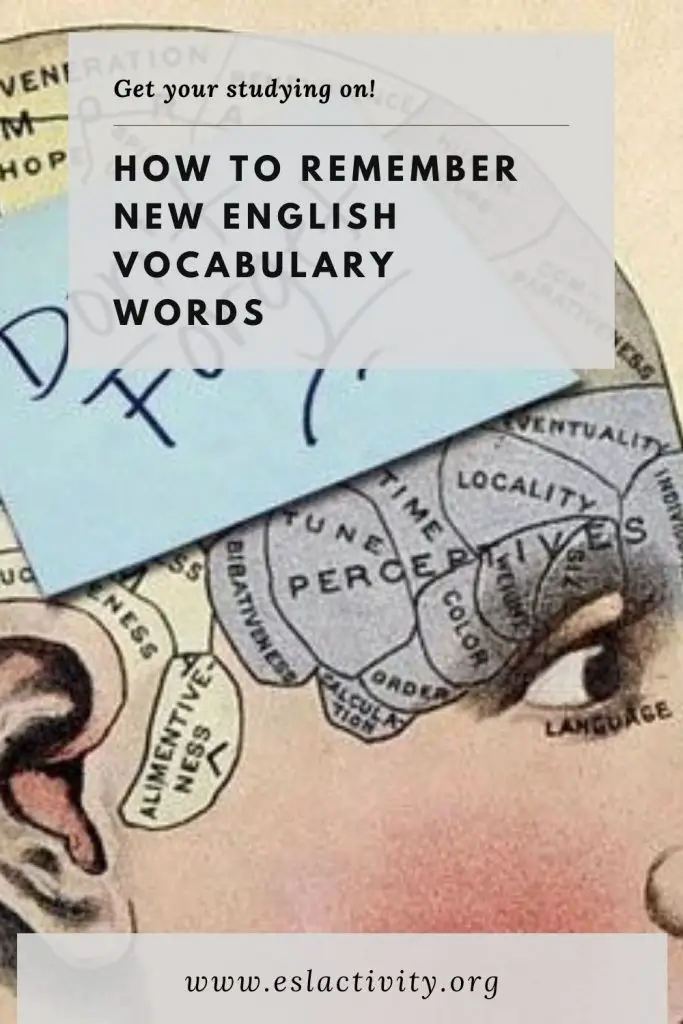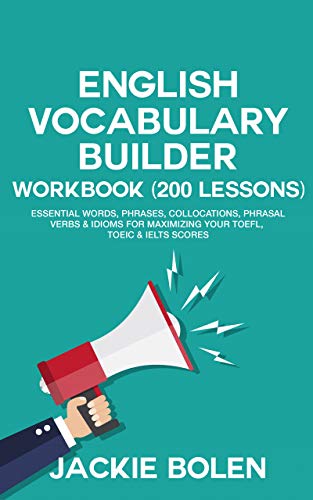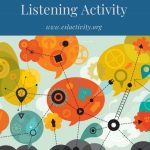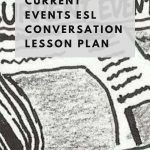If you’re looking for some solid advice on how to remember words, then you’re certainly in the right place. We have the top tips for memorizing new vocabulary words so keep on reading. If you want to know how to remember vocabulary words, then you’re certainly in the right place!

Tricks for learning new vocabulary
How to Remember Vocabulary Words: The Best Tips
Let’s get into the tricks for learning new words more easily. Find out how to memorize new words so that you’ll never forget them! How to remember English words? We have the best tips here!
#1: Use a Vocabulary Notebook
One of the best ways to remember words is to use a dedicated notebook. Write down any new words that you learn and if possible, an example sentence. It’s also helpful to include information on what kind of word it is (noun, verb, adjective, etc.) for future reference.
- Bolen, Jackie (Author)
- English (Publication Language)
- 123 Pages - 06/18/2021 (Publication Date) - Independently published (Publisher)
#2: Aim for 8-10 New Words/Day
When trying to remember new vocabulary words, aim high but not too high. Trying to remember too many words at once is an easy way to get them mixed up and not learn anything!
Instead, aim for around 8-10 new words a day. This is an achievable goal for most people but if you’re struggling with that, go for 5.
#3: Make Some Flashcards
One of the best tools for remembering words is to use flashcards. It’s easy to make your own with notecards, a hole punch and a shower ring. Carry them with you wherever you go and pull them out for a few minutes of studying whenever you have time.
Remember to study both your first language to English and then vice-versa. Also, mix up the order of the cards so as not to memorize them in any certain order. Take out the very easy ones for a period of time to focus on the ones you find more difficult as well.
#4: Extensive Reading for Memorizing English Words Quickily
When my students ask me how to remember vocabulary, I always tell them about extensive reading. Basically, this is reading someone for fun at a slightly lower level. The key is to read lots of material, quickly and without having to pull out a dictionary every few seconds.
A nice place to start is children’s fiction or newspapers that are designed especially for English learners.
#5: Learn Some Slang
A fun way to remember English vocab words is to learn some slang. These phrases and expressions are memorable and you’ll start to sound like a native English speaker.
#6 How to Remember New Words: Learn How to Use a Dictionary
A dictionary has a ton of useful stuff besides just the definition of the word. Learn how to use one to unlock all the handy learning tools.
#7: Use a Phone App for Memorizing English Vocabulary
My students often ask me how to memorize English vocabulary. One of the tips that they like best is to use a phone app that is designed specifically for this.
There are lots of phone apps out there and they are one of the best ways to remember words. Try out a few of them and see which one works for you or ask your friends for recommendations. The best ones incorporate scientific principles of language acquisition in terms of repetition.
#8: Study a Little Bit, Every Day
When trying to remember vocabulary, it’s best to study a little bit each day instead of hours in one single day. I recommend that my students spend 10-15 minutes every single day if they’re serious about learning new words.
When my students ask me how to remember English words, this is usually the most important thing that I might tell them.

How to remember vocabulary
#9: Extensive Listening to Help Remember Vocabulary Words
Like extensive reading, extensive listening is a very helpful tool for remembering new words. Think about those vocabulary words that you’re trying to learn. Now imagine hearing them when you’re listening to a podcast or a TV show. And then hearing them again the next one. That would make them pretty memorable, right?
So find something to listen to, a podcast, TV show, movie, radio program, etc. The key is that it’s not too difficult and you’re able to understand at least 90% of it quite easily. Then listen every single day for at least 15 minutes.
#10: Challenge a Friend
Things are usually more fun with friends! Memorizing vocabulary is no exception! Get together with a friend and decide on a set of vocabulary you want to learn. Then, study and be sure to give each other tests.
How to remember English words? Add a little competition to the mix and you’re sure to see some great results!
#11: Learn Language in Chunks
- Amazon Kindle Edition
- Bolen, Jackie (Author)
- English (Publication Language)
- 790 Pages - 03/04/2021 (Publication Date)
In English, there are things like ESL collocations, compound words and phrases that are often seen together. Consider the following:
- How are you?
- Open your book.
- Lunchbreak
- Goodnight
- Heavy smoker
- Light rain
It’s ideal to learn these words as a unit instead of just individually. This helps make them more memorable and accessible when you need to use them.
#12: Use What You’ve Learned
A nice way to remember English words is to use what you’ve just learned. This makes the new expressions, words, and phrases far more memorable. Here are a few ways to get some speaking practice in:
How to Remember Vocabulary FAQs
There are a number of common questions that people have about how to remember new vocabulary words. Here are the answers to some of the most popular ones.
What is the easiest way to memorize vocabulary?
There is no one easiest way to memorize vocabulary but there are a few tricks you can use:
- Review frequently.
- Use a vocabulary learning notebook.
- Read a lot.
- Watch TV and movies.
- Learn how to use a dictionary.
- Take a class.
- Make friends who speak the target language.
How can I improve my memory and vocabulary?
It’s possible to improve your memory and vocabulary by doing some of the following things:
- Use focused attention when learning new things.
- Don’t cram.
- Pay attention to structures.
- Be organized.
- Write things down and also say them out loud.
- Relate new information to things you already know.
- Visualize.

How to memorize English words
Why do I forget vocabulary?
There are a number of reasons why people forget vocabulary. Things like stress, fatigue and distraction can all lead to forgotten vocabulary words, especially in another language. However, there are some more serious problems like cognitive deterioration that can lead to this as well.
How do you master vocabulary?
If you truly want to master vocabulary, then you’ll need to spend a lot of time doing extensive reading and listening. It’s the most natural way to learn new vocab and to make the words actually “stick.” Include some targetted practice with things like flashcards and you’ll be a master in no time at all.
Tips from Experts on How to Learn a Language Quickly
If you want to memorize words easily and become fluent quickly, here are some tips from experts:
- Immerse yourself in the language. The more you hear, see, and use the target language, the faster you’ll learn it.
- Take risks. Everyone makes mistakes.
- Read a lot! Magazines, books, blogs, etc.
- Listen a lot! Podcasts, movies, TV, etc.
- Use phone apps in your spare time.
- Make friends who speak the target language.
- Take a class.
Did you like these Tricks for Memorizing Vocabulary?
- Amazon Kindle Edition
- Bolen, Jackie (Author)
- English (Publication Language)
- 138 Pages - 10/14/2017 (Publication Date)
Yes? Then you might love this book that you can find on Amazon: Study Tips to Learn English Faster. It’s the book you need if you’re serious about improving your English skills. Pick up your copy today.
How to Remember Words: Join the Conversation
Do you have any tips or tricks for memorizing vocabulary words? Leave a comment below and let us know what you think. We’d love to hear from you about how to memorize new words
Also be sure to give this article a share on Facebook, Pinterest, or Twitter. It’ll help other people, like yourself, who want to remember words more easily and quickly.
Last update on 2022-07-17 / Affiliate links / Images from Amazon Product Advertising API







